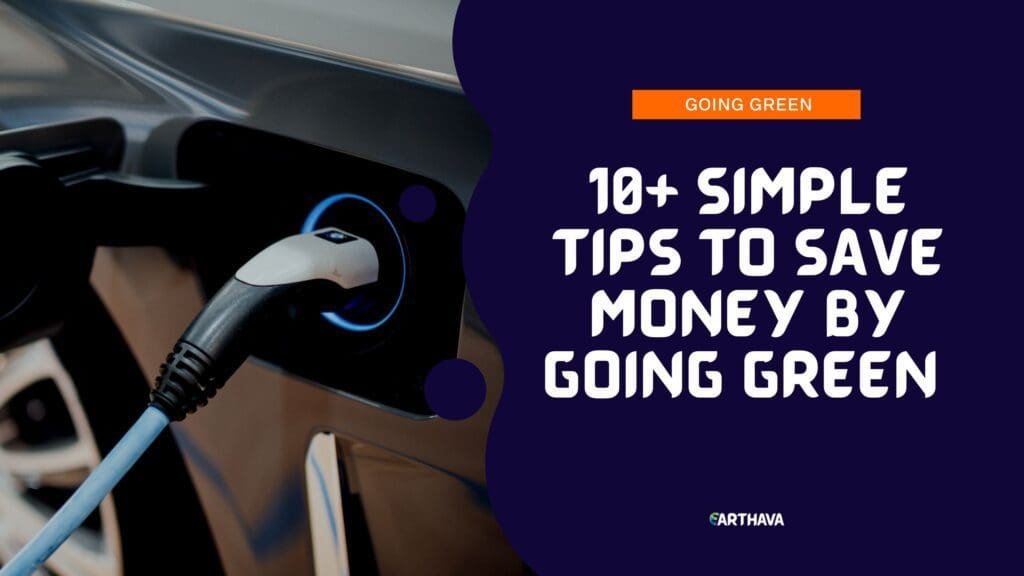Most people understand the benefits living an eco-friendly lifestyle can have on the planet. You can’t turn on the news or scroll through social media without seeing information on climate change, pollution, or excessive waste. Living a more sustainable lifestyle is important for everyone, from major corporations to the average household.

But did you know that you can also save money by leading a more eco-friendly life?
By adding more sustainable practices into your life, both the planet and your bank account could benefit. There’s an unfortunate myth that sustainable living has to be expensive. While some eco-friendly products do cost more (for good reason), so many sustainable practices can actually save you money.
Let’s dive a little deeper into some of those practices. The sooner you start making these eco-friendly changes, the sooner you’ll start seeing the savings.
Switching to Greener Transportation
One of the best ways to save money while doing your part to help the planet is by switching to a more environmentally-friendly vehicle. Electric vehicles (EVs) are becoming easier to obtain and more affordable for everyone. Some of the benefits of driving an EV include:
- Big savings on gasoline;
- They don’t emit pollutants;
- Lower maintenance;
- Better performance.
Not only will you save money on gas and maintenance when you choose to drive an electric vehicle, but you mind end up getting money back from the federal government, too. The Qualified Plug-In Electric Motor Vehicle Credit can provide a federal income tax adjustment of up to $7,500. But, not every EV qualifies. For example, one of the requirements for the credit is a vehicle with a battery capacity of at least 5 kWh. That excludes most hybrid vehicles and even some EVs.
A good rule of thumb is to talk to an experienced car salesman who regularly works with electric vehicles. They should know which ones will qualify for the credit. You can also work with your tax preparer to simplify the process and ensure you’re getting the refund you deserve if you decide to invest in an EV.
Lowering Your Utility Bills
Maybe you’re not ready to make a big purchase, especially if you’re trying to save money now. Thankfully, you can still do something good for the environment and pinch a few pennies all at once by working to reduce your utility bills at home. By using less energy at home, you’ll automatically lead a more sustainable lifestyle, and your bills will reflect that. You don’t have to make major changes to your regular home habits to make a difference in your bills. Some of the easiest ways to reduce your utility bills include:
- Installing energy-efficient appliances;
- Maintaining your HVAC system;
- Using a smart thermostat;
- Landscaping with native plants;
- Washing clothes in cold water;
- Sealing doors and windows.
As you can see, your ability to save with eco-friendly practices runs the gamut in terms of how much time and effort you want to put in — and how much you want to spend.
Keep in mind, however, that it can often be worth it to make certain investments to create a more sustainable home. Some improvements might qualify you for an energy tax credit. Things like new exterior doors, new A/C units, exterior skylights, and solar panel installation are all improvements that might entitle to you a credit, so make sure to talk to your tax preparer if you’ve done any improvements this year.
Practicing Eco-Friendly Living
There are so many tips and “tricks” you can use to greenify your home and save money in the process. But, eco-friendly living goes beyond four walls. Your regular habits can also make a big difference in the health of the planet and your wallet.
For example, things like creating your own garden can help you cut back on trips to the grocery store. That saves on gas, reduces your food bills, and can reduce the overall dependency on large farms and harmful transportation methods. Plus, the less driving you have to do, the fewer carbon emissions you’ll release if you have a traditional gas vehicle.
At home, things like taking shorter showers, running the dishwasher only when it’s full, and using rain barrels to collect water for your outdoor needs are all great ways to save water and reduce your water bill. If your family is struggling to get on board with habitual changes, consider turning them into a game. See who can take the shortest shower or who can recycle the most in a week. Small changes add up quickly. You don’t need to make major home investments or buy a new vehicle until you’re ready.
Start at a pace you’re comfortable with, take pride in knowing you’re helping the planet, and you might be surprised by just how much money you can save with a sustainable lifestyle.


